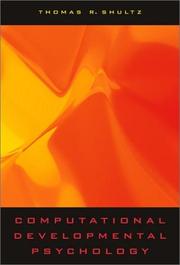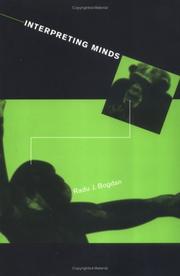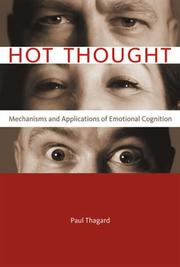
ISBN: 9780262194839 026219483X 0262303035 9780262303033 0262529157 Year: 2003 Publisher: Cambridge, Mass. : MIT Press,
Abstract | Keywords | Export | Availability | Bookmark
 Loading...
Loading...Choose an application
- Reference Manager
- EndNote
- RefWorks (Direct export to RefWorks)
An overview of the emerging discipline of computational developmental psychology, emphasizing the use of constructivist neural networks.Despite decades of scientific research, the core issues of child development remain too complex to be explained by traditional verbal theories. These issues include structure and transition, representation and processing, innate and experiential determinants of development, stages of development, the purpose and end of development, and the relation between knowledge and learning. In this book Thomas Shultz shows how computational modeling can be used to capture these complex phenomena, and in so doing he lays the foundation for a new subfield of developmental psychology, computational developmental psychology.A principal approach in developmental thinking is the constructivist one. Constructivism is the Piagetian view that the child builds new cognitive structures by using current mental structures to understand new events. In this book Shultz features constructivist models employing networks that grow as well as learn. This allows models to implement synaptogenesis and neurogenesis in a way that allows qualitative changes in processing mechanisms. The book's appendices provide additional background on the mathematical concepts used, and a companion Web site contains easy-to-use computational packages.
Cognitive psychology --- Developmental psychology --- Developmental psychology. --- Cognitive science. --- Science --- Philosophy of mind --- Development (Psychology) --- Developmental psychobiology --- Psychology --- Life cycle, Human --- COGNITIVE SCIENCES/General --- COGNITIVE SCIENCES/Psychology/Cognitive Psychology
Book
ISBN: 1282694197 9786612694196 0262255197 0262309025 9780262255196 9781282694194 9780262012843 9780262512428 0262012847 0262512424 Year: 2009 Publisher: Cambridge, Mass. MIT Press
Abstract | Keywords | Export | Availability | Bookmark
 Loading...
Loading...Choose an application
- Reference Manager
- EndNote
- RefWorks (Direct export to RefWorks)
A collection of cutting-edge work on cognition and a celebration of a foundational figure in the field.
Cognition. --- Cognitive science. --- Pylyshyn, Zenon W., --- Science --- Philosophy of mind --- Psychology --- COGNITIVE SCIENCES/General --- COGNITIVE SCIENCES/Psychology/Cognitive Psychology --- Cognitive psychology --- Cognition --- Cognitive science

ISBN: 0262268892 0585330107 9780262268899 9780262024198 9780585330105 0262024195 Year: 1997 Publisher: Cambridge, Mass. MIT Press
Abstract | Keywords | Export | Availability | Bookmark
 Loading...
Loading...Choose an application
- Reference Manager
- EndNote
- RefWorks (Direct export to RefWorks)
Unlike most current researchers in philosophy and psychology, who view interpretation as a way to understand the minds and behavior of others, Radu J. Bogdan sets out to establish a new evolutionary and practical view of interpretation. According to Bogdan, the ability to interpret others' mental states has evolved under communal, political, and epistemic pressures to enable us to cope with the impact of other organisms on our own goals in the competition to survive. Interpretation evolved among primates by natural and then cultural selection. As an adaptation, it is a competence in the form of a battery of practical skills that serve the interpreter's interests in social interactions. Evolutionary theory does not just deepen our understanding of interpretation; without it, we cannot understand what interpretation is and how it does its job. Interpreting Minds raises many thought-provoking issues for philosophers of mind and culture; evolutionary, developmental, and social psychologists; ethologists; cognitive and cultural anthropologists; evolutionary biologists; and others interested in cognitive development.
Philosophy. --- Psychology. --- Philosophy --- Psychology --- Philosophy & Religion --- Mental philosophy --- Behavioral sciences --- Mind --- Science, Mental --- Humanities --- Human biology --- Soul --- Mental health --- PHILOSOPHY/General --- COGNITIVE SCIENCES/Psychology/Cognitive Psychology
Book
ISBN: 0262320673 0262028107 1322519668 9780262320672 9780262028103 0262321157 9780262321150 0262320681 0262027569 1322094705 0262321165 0262528835 Year: 2014 Publisher: Cambridge, Massachusetts ; London, England : The MIT Press,
Abstract | Keywords | Export | Availability | Bookmark
 Loading...
Loading...Choose an application
- Reference Manager
- EndNote
- RefWorks (Direct export to RefWorks)
"The computer analogy of the mind has been as widely adopted in contemporary cognitive neuroscience as was the analogy of the brain as a collection of organs in phrenology. Just as the phrenologist would insist that each organ must have its particular function, so contemporary cognitive neuroscience is committed to the notion that each brain region must have its fundamental computation. In After Phrenology, Michael Anderson argues that to achieve a fully post-phrenological science of the brain, we need to reassess this commitment and devise an alternate, neuroscientifically grounded taxonomy of mental function. Anderson contends that the cognitive roles played by each region of the brain are highly various, reflecting different neural partnerships established under different circumstances. He proposes quantifying the functional properties of neural assemblies in terms of their dispositional tendencies rather than their computational or information-processing operations. Exploring larger-scale issues, and drawing on evidence from embodied cognition, Anderson develops a picture of thinking rooted in the exploitation and extension of our early-evolving capacity for iterated interaction with the world. He argues that the multidimensional approach to the brain he describes offers a much better fit for these findings, and a more promising road toward a unified science of minded organisms"--MIT CogNet.
Brain --- Physiology. --- COGNITIVE SCIENCES/General --- COGNITIVE SCIENCES/Psychology/Cognitive Psychology --- NEUROSCIENCE/General --- Neuropsychology --- Methods --- Cognition --- Cognitive psychology --- Physiology of nerves and sense organs --- Physiology
Book
ISBN: 0262329824 0262329832 0262029782 9780262329828 9780262029780 9780262329835 Year: 2015 Publisher: Cambridge, MA
Abstract | Keywords | Export | Availability | Bookmark
 Loading...
Loading...Choose an application
- Reference Manager
- EndNote
- RefWorks (Direct export to RefWorks)
A novel, wide-ranging, and comprehensive account of how human emotionality develops, proposing a process in which "nature" and "nurture" are integrated.
Emotions. --- Feelings --- Human emotions --- Passions --- Psychology --- Affect (Psychology) --- Affective neuroscience --- Apathy --- Pathognomy --- PHILOSOPHY/General --- COGNITIVE SCIENCES/Psychology/Cognitive Psychology --- Metaphysics --- Philosophical anthropology --- Theory of knowledge
Book
ISBN: 0262279495 1417560673 9780262279499 9781417560677 Year: 2004 Publisher: Cambridge, Mass. : MIT Press,
Abstract | Keywords | Export | Availability | Bookmark
 Loading...
Loading...Choose an application
- Reference Manager
- EndNote
- RefWorks (Direct export to RefWorks)
Early Reading Instruction is a comprehensive analysis of the research evidence from early writing systems to computer models of reading. In this book, Diane McGuinness provides an innovative solution to the "reading war"--the century-old debate over the efficacy of phonics (sound-based) versus whole-word (meaning- based) methods. She has developed a prototype--a set of elements that are critical to the success of a reading method.McGuinness shows that all writing systems, without exception, are based on a sound unit in the language. This fact, and other findings by paleographers, provides a platform for the prototype. Other elements of the prototype are based on modern research. For example, observational studies in the classroom show that time spent on three activities strongly predicts reading success: learning phoneme/symbol correspondences, practice at blending and segmenting phonemes in words, and copying/writing words, phrases, and sentences. Most so-called literacy activities have no effect, and some, like sight word memorization, have a strongly negative effect.The National Reading Panel (2000) summarized the research on reading methods after screening out thousands of studies that failed to meet minimum scientific standards. In an in-depth analysis of this evidence, McGuinness shows that the most successful methods (children reading a year or more above age norms) include all the elements in the prototype. Finally, she argues, because phonics-type methods are consistently shown to be superior to whole-word methods in studies dating back to the 1960s, it makes no sense to continue this line of research. The most urgent question for future research is how to get the most effective phonics programs into the classroom.

ISBN: 026220164X 0262701243 9786612098468 0262284847 1282098462 1429410027 9780262201643 0262303469 9780262284844 9781282098466 9780262701242 9781429410021 6612098465 9780262303460 Year: 2006 Publisher: Cambridge, Mass. MIT Press
Abstract | Keywords | Export | Availability | Bookmark
 Loading...
Loading...Choose an application
- Reference Manager
- EndNote
- RefWorks (Direct export to RefWorks)
"In Hot Thought, Paul Thagard describes the mental mechanisms - cognitive, neural, molecular, and social - that interact to produce different kinds of human thinking, from everyday decision making to legal reasoning, scientific discovery, and religious belief, and he discusses when and how thinking and reasoning should be emotional." "Thagard argues that an understanding of emotional thinking needs to integrate the cognitive, neural, molecular, and social levels. Many of the chapters employ computational models of various levels of thinking, including HOTCO (hot cognition) models and the more neurologically realistic GAGE model. Thagard uses these models to illuminate thinking in the domains of law, science, and religion, discussing such topics as the role of doubt and reasonable doubt in legal and other contexts, valuable emotional habits for successful scientists, and the emotional content of religious beliefs. Identifying and assessing the impact of emotion, Thagard argues, can suggest ways to improve the process of reasoning."--Jacket.
Book
ISBN: 0262019582 1299848435 026231469X 9781461943266 1461943264 9781299848436 9780262314701 0262314703 9780262314695 9780262019583 9780262529020 Year: 2013 Publisher: Cambridge, MA : MIT Press,
Abstract | Keywords | Export | Availability | Bookmark
 Loading...
Loading...Choose an application
- Reference Manager
- EndNote
- RefWorks (Direct export to RefWorks)
This volume offers a comprehensive overview of the latest neuroscientific approaches to the scientific study of creativity. In chapters that progress logically from neurobiological fundamentals to systems of neuroscience and neuro-imaging, leading scholars describe the latest theoretical, genetic, structural, clinical, functional, and applied research on the neural bases of creativity.
Creative ability. --- Cognitive neuroscience. --- COGNITIVE SCIENCES/Psychology/Cognitive Psychology --- NEUROSCIENCE/General --- Cognitive neuropsychology --- Cognitive science --- Neuropsychology --- Creativeness --- Creativity --- Ability --- Creation (Literary, artistic, etc.)
Book
ISBN: 0262034085 0262335123 0262335115 9780262335119 9780262335102 0262335107 9780262335126 9780262034081 Year: 2016 Publisher: Cambridge, Massachusetts : The MIT Press,
Abstract | Keywords | Export | Availability | Bookmark
 Loading...
Loading...Choose an application
- Reference Manager
- EndNote
- RefWorks (Direct export to RefWorks)
"This volume contributes to a current debate within the psychology of thought that has wide implications for our ideas about creativity, decision making, and economic behavior. The essays focus on the role of implicit, unconscious thinking in creativity and problem solving, the interaction of intuition and analytic thinking, and the relationship between communicative heuristics and thought. The analyses move beyond the conventional conception of mind informed by extra-psychological theoretical models toward a genuinely psychological conception of rationality--a rationality no longer limited to conscious, explicit thought, but able to exploit the intentional implicit level. The contributors consider a new conception of human rationality that must cope with the uncertainty of the real world; the implications of abandoning the normative model of classic logic and adopting a probabilistic approach instead; the argumentative and linguistic aspects of reasoning; and the role of implicit thought in reasoning, creativity, and its neurological base"--MIT CogNet.
Cognitive psychology --- Reasoning (Psychology) --- Cognition. --- Subconsciousness. --- COGNITIVE SCIENCES/General --- COGNITIVE SCIENCES/Psychology/Cognitive Psychology --- Unconscious (Psychology) --- Unconsciousness --- Psychology --- Thought and thinking
Book
ISBN: 0262037653 0262345498 9780262345491 9780262037655 Year: 2018 Publisher: Cambridge (Mass.) MIT Press
Abstract | Keywords | Export | Availability | Bookmark
 Loading...
Loading...Choose an application
- Reference Manager
- EndNote
- RefWorks (Direct export to RefWorks)
An empirically informed, philosophical account of the nature of anxiety and its value for agency, virtue, and decision making.
Emotions (Philosophy) --- Anxiety. --- Philosophical anthropology --- General ethics --- PHILOSOPHY/General --- COGNITIVE SCIENCES/Psychology/Cognitive Psychology --- COGNITIVE SCIENCES/General --- Philosophy --- Angst --- Anxieties --- Anxiousness --- Emotions --- Stress (Psychology) --- Agitation (Psychology) --- Fear --- Worry

 Search
Search Feedback
Feedback About
About Help
Help News
News